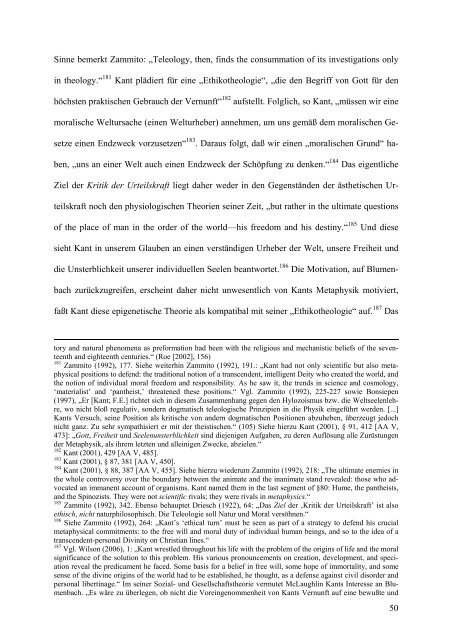Weltseele und unendlicher Verstand - Salomon Maimon
Weltseele und unendlicher Verstand - Salomon Maimon
Weltseele und unendlicher Verstand - Salomon Maimon
Erfolgreiche ePaper selbst erstellen
Machen Sie aus Ihren PDF Publikationen ein blätterbares Flipbook mit unserer einzigartigen Google optimierten e-Paper Software.
Sinne bemerkt Zammito: „Teleology, then, finds the consummation of its investigations only<br />
in theology.“ 181 Kant plädiert für eine „Ethikotheologie“, „die den Begriff von Gott für den<br />
höchsten praktischen Gebrauch der Vernunft“ 182 aufstellt. Folglich, so Kant, „müssen wir eine<br />
moralische Weltursache (einen Welturheber) annehmen, um uns gemäß dem moralischen Ge-<br />
setze einen Endzweck vorzusetzen“ 183 . Daraus folgt, daß wir einen „moralischen Gr<strong>und</strong>“ ha-<br />
ben, „uns an einer Welt auch einen Endzweck der Schöpfung zu denken.“ 184 Das eigentliche<br />
Ziel der Kritik der Urteilskraft liegt daher weder in den Gegenständen der ästhetischen Ur-<br />
teilskraft noch den physiologischen Theorien seiner Zeit, „but rather in the ultimate questions<br />
of the place of man in the order of the world—his freedom and his destiny.“ 185 Und diese<br />
sieht Kant in unserem Glauben an einen verständigen Urheber der Welt, unsere Freiheit <strong>und</strong><br />
die Unsterblichkeit unserer individuellen Seelen beantwortet. 186 Die Motivation, auf Blumen-<br />
bach zurückzugreifen, erscheint daher nicht unwesentlich von Kants Metaphysik motiviert,<br />
faßt Kant diese epigenetische Theorie als kompatibal mit seiner „Ethikotheologie“ auf. 187 Das<br />
tory and natural phenomena as preformation had been with the religious and mechanistic beliefs of the seventeenth<br />
and eighteenth centuries.“ (Roe [2002], 156)<br />
181<br />
Zammito (1992), 177. Siehe weiterhin Zammito (1992), 191.: „Kant had not only scientific but also metaphysical<br />
positions to defend: the traditional notion of a transcendent, intelligent Deity who created the world, and<br />
the notion of individual moral freedom and responsibility. As he saw it, the trends in science and cosmology,<br />
‘materialist’ and ‘pantheist,’ threatened these positions.“ Vgl. Zammito (1992), 225-227 sowie Bonsiepen<br />
(1997), „Er [Kant; F.E.] richtet sich in diesem Zusammenhang gegen den Hylozoismus bzw. die <strong>Weltseele</strong>nlehre,<br />
wo nicht bloß regulativ, sondern dogmatisch teleologische Prinzipien in die Physik eingeführt werden. [...]<br />
Kants Versuch, seine Position als kritische von andern dogmatischen Positionen abzuheben, überzeugt jedoch<br />
nicht ganz. Zu sehr sympathisiert er mit der theistischen.“ (105) Siehe hierzu Kant (2001), § 91, 412 [AA V,<br />
473]: „Gott, Freiheit <strong>und</strong> Seelenunsterblichkeit sind diejenigen Aufgaben, zu deren Auflösung alle Zurüstungen<br />
der Metaphysik, als ihrem letzten <strong>und</strong> alleinigen Zwecke, abzielen.“<br />
182<br />
Kant (2001), 429 [AA V, 485].<br />
183<br />
Kant (2001), § 87, 381 [AA V, 450].<br />
184<br />
Kant (2001), § 88, 387 [AA V, 455]. Siehe hierzu wiederum Zammito (1992), 218: „The ultimate enemies in<br />
the whole controversy over the bo<strong>und</strong>ary between the animate and the inanimate stand revealed: those who advocated<br />
an immanent account of organisms. Kant named them in the last segment of §80: Hume, the pantheists,<br />
and the Spinozists. They were not scientific rivals; they were rivals in metaphysics.“<br />
185<br />
Zammito (1992), 342. Ebenso behauptet Driesch (1922), 64: „Das Ziel der ‚Kritik der Urteilskraft’ ist also<br />
ethisch, nicht naturphilosophisch. Die Teleologie soll Natur <strong>und</strong> Moral versöhnen.“<br />
186<br />
Siehe Zammito (1992), 264: „Kant’s ‘ethical turn’ must be seen as part of a strategy to defend his crucial<br />
metaphysical commitments: to the free will and moral duty of individual human beings, and so to the idea of a<br />
transcendent-personal Divinity on Christian lines.“<br />
187<br />
Vgl. Wilson (2006), 1: „Kant wrestled throughout his life with the problem of the origins of life and the moral<br />
significance of the solution to this problem. His various pronouncements on creation, development, and speciation<br />
reveal the predicament he faced. Some basis for a belief in free will, some hope of immortality, and some<br />
sense of the divine origins of the world had to be established, he thought, as a defense against civil disorder and<br />
personal libertinage.“ Im seiner Sozial- <strong>und</strong> Gesellschaftstheorie vermutet McLaughlin Kants Interesse an Blumenbach.<br />
„Es wäre zu überlegen, ob nicht die Voreingenommenheit von Kants Vernunft auf eine bewußte <strong>und</strong><br />
50


